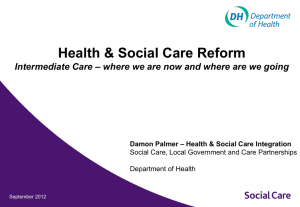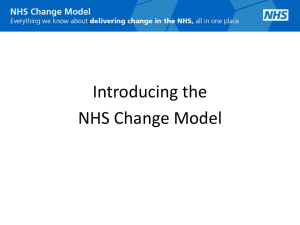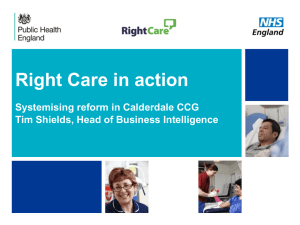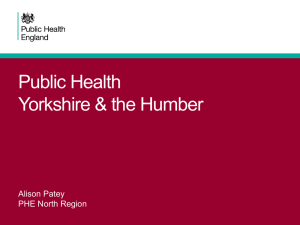Can the English National Health Service learn from the Dutch reforms?
advertisement
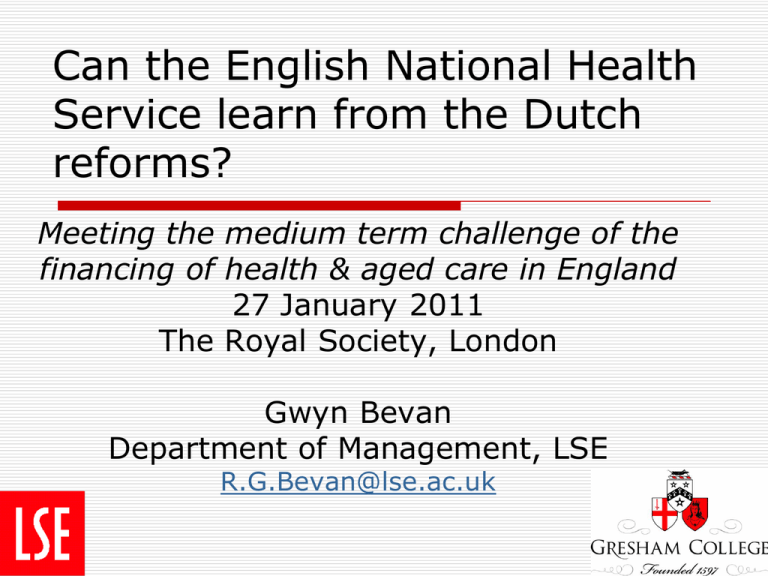
Can the English National Health
Service learn from the Dutch
reforms?
Meeting the medium term challenge of the
financing of health & aged care in England
27 January 2011
The Royal Society, London
Gwyn Bevan
Department of Management, LSE
R.G.Bevan@lse.ac.uk
Objectives of health care reforms in
OECD countries*
2. Cost control: rationing & expenditure caps
UK
from
1990s
1. Equity: access by need
not ability to pay
3. Performance:
incentives &
competition
* Cutler (2002) Equality, Efficiency, & Market Fundamentals: The Dynamics of
International Medical-Care Reform. Journal of Economic Literature.
Law of requisite variety:
3 goals 3 instruments
Cost control
Equity
Performance
NHS 1980s: 3 goals & 2
instruments
Cost control: fixed
total budget
Formula funding
equitable allocations
Health
authorities
run providers
Below target
income: no
‘efficiency’ savings
‘Efficiency’
savings
Above target
income: cuts not
‘efficiency’ savings
From 1991: purchaser / provider
3 goals & 3 instruments
Cost control: fixed
total budget
Formula funding
equitable allocations
NHS providers
Efficiency by
competition
Purchasers
Private providers
Internal market (1989 -97):
Design*
Purchaser / Provider
Provider competition
‘money follows the patient’
Selective contracting
health authorities
GP fundholders
(no patient choice)
*Working for Patients
Internal market (1989 -97):
Impact
Le Grand (1999)*
Little evidence of change
Incentives too weak & constraints
too strong
Tuohy (1999)**
NHS logic
Ministerial accountability
Collegial decision making
Poor information on prices & quality
* Le Grand (1999) Competition, cooperation, or control? Health Affairs
** Tuohy (1999) Accidental Logics. Oxford University Press
Patient choice & competition
(2006 - 10): Design*
Provider competition
‘money follows the patient’ (PbR)
standard tariff: quality competition
Selective contracting
Primary Care Trusts
World Class Commissioning
Patient choice
Provider diversity
Foundation Trusts & Independent
Sector Treatment Centres
*Delivering the NHS Plan
Patient choice & competition
(2006 - 10): Impact
No
Failure to create
functioning market*
political interference
weak purchasers
barriers to exit &
entry
changing policies
reorganisations
* Brereton & Vasoodaven (2010)
http://www.civitas.org.uk/nhs/download/Civitas_LiteratureRe
view_NHS_market_Feb10.pdf
Impact both NHS markets?
Overview of literature*
No good evidence reforms produced
beneficial outcomes classical economic
theory predicts of markets
provider responsiveness to patients &
purchasers
large-scale cost reduction
innovation in service provision
NHS incurs transaction costs of market
without benefits?
* Brereton & Vasoodaven (2010)
http://www.civitas.org.uk/nhs/download/Civitas_LiteratureReview_NHS_market_Feb10.pdf
NHS from 2010?
We will stop the top-down reorganisations of
the NHS that have got in
the way of patient care
If reorganisation of purchasers
is the answer …
Population ('000s)
500
400
300
200
100
0
91-94
94-97
97-01
GP
01-05
05-11
Authority
11-13
13-?
Liberating the NHS: Objectives?*
NHS commissioning board
Steering not rowing?
GP Consortia
GPs involved in shaping services?
Independent providers
Choice & managed competition?
Reorganisation
Evolution not revolution?
* Equity and excellence: Liberating the NHS
Reflections: 20 years of
market reforms
The Netherlands
1 agreed policy
Dutch procession of
Echternach
MHP competition
as yet little selective
contracting
Model exported
Germany &
Switzerland
England
5 blitzkriegs (SW1)
army of occupation in
hostile territory?*
Provider
competition
limited impact
Model abandoned
New Zealand,
Scotland & Wales
*Shock (1994) Medicine at the centre of the nation’s affairs, BMJ
Going Dutch: Provider
Purchaser competition?
Cost control: fixed
total budget
Risk-adjusted
funding
equitable
allocations
PCT clusters
Efficiency by
purchaser
competition &
selective
contracting /
integration
Mutual Healthcare
Purchasers (MHPs)
Mutual Healthcare Purchasers
(MHPs)
Plurality
PCTs / GP consortia
Insurers? Foundation Trusts?
Define catchment areas
Guarantee duty of care
Selectively contract / integrate
Explicit insurance contract
Choice of packages
Restrict choice? Charges?
NHS Commissioning Board:
Regulation of MHPs
Entry
key competences & duty of quality
Competition
sufficient numbers & information
Equity
funding & open enrolment
Insurance
solvency & transparency
Can the English National Health
Service learn from the Dutch
reforms?*
Thank you
Gwyn Bevan
Department of Management, LSE
R.G.Bevan@lse.ac.uk
* Bevan & van de Ven (2010). Choice of
providers & Mutual Healthcare Purchasers:
can the English NHS learn from the Dutch
reforms? Health Economics, Policy & Law

